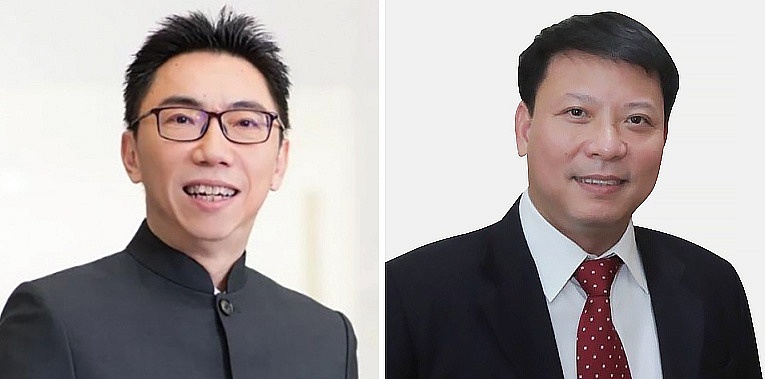The next generation has what it takes
What took place at PwC’s NextGen event at the end of May, and what specific topics were discussed?
Quan: We held the Asia-Pacific NextGen Club event in Singapore, marking it our third event. We launched this initiative in 2017, inspired by the numerous NextGen clubs organised by PwC across various Asia-Pacific countries, with around 80 participants from 14 countries.
 |
| Ng Siew Quan, Asia-Pacific Entrepreneurial and Private Business Leader for PwC Singapore; and Hoang Viet Cuong, Partner at Entrepreneurial and Private Business for PwC Vietnam |
The goal was to bring these groups together for networking and to share common issues and challenges. In 2019, we held the event in Shanghai, which also attracted a large turnout. Unfortunately, due to the pandemic, we paused until this year.
This year, we had over 70 participants from 16 countries, maintaining a well-balanced mix by limiting each country’s participants to no more than 10. Six individuals from Vietnam attended, and the feedback has been positive. A key objective was to launch the Asia-Pacific version of the NextGen survey and discuss shared challenges among the next generation.
One of the greatest takeaways was the evolution of generative AI and its potential to transform family businesses. As wealth transitions from one generation to the next, the next generation is well-positioned to elevate traditional family businesses.
At the event, various speakers covered topics such as AI, new technology, and wealth management through family offices. I observed that Vietnamese family businesses are relatively young, mostly 30-40 years old, as the economy opened up only about 40 years ago.
While countries like Singapore, Malaysia, Indonesia, and Thailand, with family businesses 70-80 years old, are going through the transition now, for Vietnam the transition might not be immediate.
However, it is expected within the next 5-10 years, and there’s an urgent need to ensure that this transition is smooth.
What were the key findings from the NextGen 2024 survey, specific to the Vietnam market?
Cuong: The survey, first released in 2013, highlighted in its previous 2022 edition the emerging role of the next generation during the pandemic. In Vietnam, 52 per cent of respondents now occupy leadership positions, up from 29 per cent in 2022. Additionally, 72 per cent are involved in succession planning, with 39 per cent actively developing plans, compared to 58 per cent and 26 per cent in 2022.
Amidst technological disruption, Vietnamese next-generation leaders remain focused on securing their family businesses’ prosperity, while technology adoption is also a key priority. This demonstrates a clear vision for success in the new era.
Technological advancements, especially generative AI (GenAI), are prompting significant strategy shifts for CEOs. In Vietnam, 82 per cent of next-generation leaders are enthusiastic about GenAI, and 55 per cent feel knowledgeable about it. However, a large proportion of Vietnamese family businesses are still early in AI adoption.
While 27 per cent are piloting and exploring AI initiatives and 76 per cent of young leaders expect future involvement, challenges remain. 73 per cent foresee increased competition, 70 per cent struggle with AI advancements, 48 per cent find it difficult to capitalise on AI, and 58 per cent express cybersecurity concerns, including data breaches, misinformation, and legal risks.
Were there any findings in the report that stood out to you as surprising compared to other countries in the region?
Quan: Vietnam is a bit behind the region. Because this is the first time we are conducting this survey in Vietnam, there aren’t many comparisons to draw. It’s not surprising that the Asia-Pacific region lags behind in many areas, and within the region, some countries, particularly those with a shorter history of family businesses, are not performing as well.
However, starting late has its advantages, as you can adopt the latest technology without needing to overhaul the legacy systems. From meetings and feedback I gathered in Vietnam, there’s a clear recognition among family businesses of the need for change.
I have heard business leaders, even those in their 60s, acknowledge the importance of a transition and are eager to support and help the next generation succeed. This is a promising sign.
Based on your international experience, what strategies can family businesses in the Asia-Pacific region employ to address the challenges associated with generational transition?
Quan: In Asia-Pacific, this is the first time that large family businesses are experiencing a transition, so they have not yet had experience. Setting aside Vietnam, which is very young, even in countries like Singapore, Indonesia, Malaysia, and Thailand, many of these businesses are about 80 years old, starting after World War 2.
When the current generation took over the business from their parents, it was actually minimal. As they are now in their 70s, they have no experience handing over a large business because the previous generation didn’t have this problem. This is a fundamental challenge.
Additionally, the current generation, unlike their parents, lives longer. As many of them will live into their 80s and 90s, if they hand over, there will be a period whereby they will be without anything to do. This issue has been addressed.
Earlier, I mentioned family offices, which is something they can do. Alternatively, they can take on certain projects and let the next generation run the company, or they can be the chairman of the board but let someone younger be the CEO.
On the flip side, there is a shift in the way that the world is operating, so many of the current gen may not be as familiar with the new world as the next generation. Like I said, they are more willing to let go and let them run the show.
One of the key challenges of the current gen is how to ensure that they can let go and let the next gen make some mistakes because that’s the only way that they can learn.
If you look at it, the transition in the last 5-10 years has probably been better than it was before. For a country like Vietnam which is still in the early stages, there are plenty of lessons you can learn from and make the transition less painful.
 |
| Next-gen leaders are focused on securing their family’s prosperity, while tech adoption is also a priority, photo Le Toan |
What are some of your advice for young family businesses in Vietnam?
Quan: For family businesses, you need to professionalise the business by having proper systems, proper human resources structure, and the right talents to be in the business. That’s the first stage.
But the more important stage is professionalising the family: how to make the family business behave as if there is governance over the family and not just over the business. Numerous companies in Europe have been doing this for a long time, and have had 200 years to perfect this formula.
There are two types of succession: in wealth and in leadership. While succession of wealth is easier to do, succession in leadership is more challenging. Not because you have the same blood as me that you automatically know what to do. So that is something family businesses need to work on.
Could you elaborate on the concept of a “family office,” which has gained significant popularity in developed economies such as Singapore?
Quan: Family offices represent an evolution in the lifecycle of family businesses. Many family businesses in Europe, the West, and parts of Asia, like Singapore, have been operating for generations.
The next generation may not be interested in taking over the business, raising the question of how to ensure its continuity. With significant wealth created, it’s crucial to manage it effectively to sustain it for future generations.
A family office is essentially a fund management company that invests the accumulated wealth of the family business. Beyond investing in the capital and money markets, there is a growing trend to invest in other companies. The way it works is quite similar to private equity but termed as “family equity”.
 | Raffles Family Office bolsters private equity focus in Southeast Asia In an effort to diversify its portfolio, Raffles Family Office – a prominent wealth management firm – is placing increased emphasis on private equity transactions within Southeast Asia. However, challenging conditions in 2022 have led to a decline in deal value and volume in Southeast Asia's private equity market, as reported by Bain & Co. |
 | More demand felt for family office services in Vietnam The flourishing expansion of high-net-worth clientele across Southeast Asia, particularly in Vietnam, is stimulating growing interest among foreign family offices, leading to a reconfiguration of investment strategies and opening pathways to unparalleled opportunities. |
 | VinFast targets family offices, eyes alternative assets for growth VinFast, the electric vehicle (EV) arm of Vietnam's Vingroup, is actively courting family offices and the alternative assets sector in an effort to diversify its investment base, according to DealStreetAsia. |
What the stars mean:
★ Poor ★ ★ Promising ★★★ Good ★★★★ Very good ★★★★★ Exceptional
Related Contents
Latest News
More News
- Businesses bouncing back after turbulent year (February 27, 2026 | 16:42)
- PM outlines new tasks for healthcare sector (February 25, 2026 | 16:00)
- Ho Chi Minh City launches plan for innovation and digital transformation (February 25, 2026 | 09:00)
- Vietnam sets ambitious dairy growth targets (February 24, 2026 | 18:00)
- Masan Consumer names new deputy CEO to drive foods and beverages growth (February 23, 2026 | 20:52)
- Myriad risks ahead, but ones Vietnam can confront (February 20, 2026 | 15:02)
- Vietnam making the leap into AI and semiconductors (February 20, 2026 | 09:37)
- Funding must be activated for semiconductor success (February 20, 2026 | 09:20)
- Resilience as new benchmark for smarter infrastructure (February 19, 2026 | 20:35)
- A golden time to shine within ASEAN (February 19, 2026 | 20:22)

 Tag:
Tag:


















 Mobile Version
Mobile Version